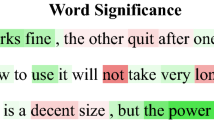Abstract
This paper presents a method of improving the performance of sentence-level sentiment analysis. Sentiment analysis is generally understood as a task that requires a deep understanding of the sentence structure (e.g., word order and non-local dependency). To attack this problem without the sentence parsing, we propose a novel approach that decomposes a sentence into a series of sub-sequences. Sentence-level polarity is then determined by classifying within sub-sequences and by fusing the obtained sub-sequences polarities. Extensive evaluations are conducted on one benchmark dataset for sentence polarity detection. Experimental results show that the performance of our proposed method outperforms two baselines based on Support Vector Machines (SVMs) and Logistic Regression (LR), respectively.
Access this chapter
Tax calculation will be finalised at checkout
Purchases are for personal use only
Preview
Unable to display preview. Download preview PDF.
Similar content being viewed by others
References
Matsumoto, S., Takamura, H., Okumura, M.: Sentiment classification using word sub-sequences and dependency sub-trees. In: Ho, T.-B., Cheung, D., Liu, H. (eds.) PAKDD 2005. LNCS (LNAI), vol. 3518, pp. 301–311. Springer, Heidelberg (2005)
Meena, A., Prabhakar, T.V.: Sentence Level Sentiment Analysis in the Presence of Conjuncts Using Linguistic Analysis. In: Amati, G., Carpineto, C., Romano, G. (eds.) ECiR 2007. LNCS, vol. 4425, pp. 573–580. Springer, Heidelberg (2007)
Qu, L., Toprak, C., Jakob, N., Gurevych, I.: Sentence Level Subjectivity and Senti-ment Analysis Experiments in NTCIR-7 MOAT Challenge. In: Proceedings of NTCIR-7 Workshop Meeting, pp. 210–217 (2007)
Hatzivassiloglou, V., McKeown, K.R.: Predicting the Semantic Orientation of Adjectives. In: Proceedings of the 35th Annual Meeting of the ACL and the 8th Conference of the European Chapter of the ACL, pp. 174–181. Association for Computational Linguistics, Madrid (1997)
Turney, P.D., Littman, M.L.: Measuring praise and criticism: Inference of semantic orientation from association. ACM Transactions on Information Systems (TOIS) 21(4), 315–346 (2003) (NRC #46516)
Nasukawa, T., Yi, J.: Sentiment analysis: capturing favorability using natural language processing. K-CAP, 70–77 (2003)
Wilson, T., Wiebe, J., Hoffmann, P.: Recognizing contextual polarity in phrase-level sentiment analysis. In: Proceedings of the Human Language Technology Conference and the Conference on Empirical Methods in Natural Language Processing (HLT/EMNLP), pp. 347–354 (2005)
Yu, H., Hatzivassiloglou, V.: Towards answering opinion questions: Separating facts from opinions and identifying the polarity of opinion sentences. In: Proceedings of the 2003 Conference on Empirical Methods in Natural Language Processing (EMNLP-2003), pp. 129–136 (2003)
Kim, S.-M., Hovy, E.: Determining the sentiment of opinions. In: Proceedings of COLING 2004 (2004)
Hu, M., Liu, B.: Mining and summarizing customer reviews. In: KDD-2004 (2004)
Grefenstette, G., Qu, Y., Shanahan, J.G., Evans, D.A.: Coupling niche browsers and affect analysis for an opinion mining application.In: RIAO-2004 (2004)
Pang, B., Lee, L., Vaithyanathan, S.: Thumbs up? Sentiment classification using ma-chine learning techniques. In: Proceedings of the Conference on Empirical Methods in Natural Language Processing (EMNLP-2002), pp. 79–86 (2002)
Pang, B., Lee, L.: A sentimental education: Sentiment analysis using subjectivity summarization based on minimum cuts. In: Proceedings of 42nd Meeting of the Association for Computational Linguistics (ACL-2004), pp. 271–278 (2004)
Nigam, K., Hurst, M.: Towards a Robust Metric of Opinion. In: AAAI Spring Symposium on Exploring Attitude and Affect in Text (2004)
Author information
Authors and Affiliations
Editor information
Editors and Affiliations
Rights and permissions
Copyright information
© 2011 Springer-Verlag Berlin Heidelberg
About this paper
Cite this paper
Liu, X., Zhou, M. (2011). Sentence-Level Sentiment Analysis via Sequence Modeling. In: Zhang, J. (eds) Applied Informatics and Communication. ICAIC 2011. Communications in Computer and Information Science, vol 226. Springer, Berlin, Heidelberg. https://doi.org/10.1007/978-3-642-23235-0_44
Download citation
DOI: https://doi.org/10.1007/978-3-642-23235-0_44
Publisher Name: Springer, Berlin, Heidelberg
Print ISBN: 978-3-642-23234-3
Online ISBN: 978-3-642-23235-0
eBook Packages: Computer ScienceComputer Science (R0)




